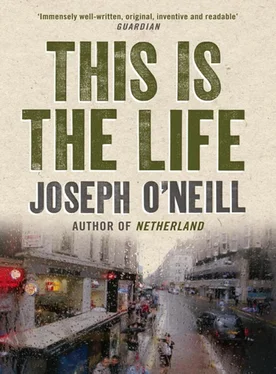I carefully replaced the writing papers (six sheets) in the envelope and re-sealed it with glue that I keep handy in a desk drawer. It was not possible, outside of a forensic examination, to tell that I had broken the letter-flap, that I had — let me make no bones about it — broken Donovan’s trust.
Once I had covered my tracks I gave the letter some thought. There was no doubt that, on paper, it expressed a powerful equitable argument. A neutral bystander armed with the bare facts would have to agree that Arabella should not, as a matter of fairness, have left Donovan in the lurch without any explanation or notice. To take a legal analogy, it was arguable that he had been unfairly dismissed: the procedures of consultation and warnings which a husband of twelve years might reasonably expect had not been followed. It might well be that Arabella was right to leave Donovan: but that did not mean that he was no longer entitled to a hearing, especially as there was a possibility that, after such a hearing, she might have a change of heart.
To my mind, the letter showed that Donovan had something of a contractual approach to marriage. He saw it as an organic, mobile bundle of undertakings, reciprocal duties and implied terms. One of these, it seemed, was that a benefit to one party gave rise to a debt to the other. Arabella had obtained a benefit when she left him, but she had also incurred a debt: in return for her new freedom she owed him reasons and a chance to put his case. These letters from Donovan, I reflected, could be said to boil down to marital bills of exchange. Or maybe (this was playful conjecture on my part) Donovan saw marriage as a type of treaty, a bilateral agreement concluded between two sovereign persons — a concordat of love containing provisions and articles and reservations that could be invoked and enforced. (The law, I should say, took a different view of wedlock to Donovan. In its eyes, marriage was not a species of contract but a state of affairs. Quite whether this distinction clarifies anything I am not sure.)
I must say that in all the matrimonial cases I had ever worked on I had never come across a letter making an appeal to justice quite like this one. At first I did not know what to make of it; surely this legalistic approach, this reliance on objective standards of fairness, was, well, inappropriate? Surely the heart ruled the head in these matters? Then I remembered: these letters were not written by just anybody, they were penned by Professor Michael Donovan QC. If anyone knew what they were doing it was he. If he considered that this tack would succeed, then no doubt he was right; quite apart from his natural tactical gift, did he not know his wife better than anyone?
The second letter that I opened, dated 29 October, was relatively brief. It began with a definition: an irrational course of action is one which plainly will not achieve the result which it is intended to achieve. It is irrational, for example, Donovan patiently explained, to scramble eggs in order to reach the moon. Similarly, Donovan said to Arabella, your actions are irrational on two planes. The petition was irrational because its weakness at law meant that it would not succeed in bringing about a divorce; and bringing about a divorce was irrational because it would not succeed in bringing her happiness. On the contrary, it would bring her nothing but misery. Surely she must see that? And if she did, surely she would act upon that insight?
There was one more thing (I continue to paraphrase). Should they not see a marriage guidance counsellor? Donovan was ready to put in as many sessions as it would take. Perhaps that was what they needed, a bit of expert advice. They could air their grievances, they could listen to each other afresh and maybe even really hear each other. What did she think about that? Would not a calm, rational third party be helpful in this complicated and inflamed situation? He asked her to think about it, in her own good time. He loved her.
As I glued up the envelope I gave a little smile. It was revealing that Donovan should suggest an arbitrator to cure the problems, and it was also a smart move. It was an arrangement he would naturally feel very comfortable with, addressing arguments to a presiding authority.
I opened the last letter of the series. It was dated 28 November, the day of the pre-trial review. It was completely different to the others and after I had read it once I told June, rather dramatically, to hold all calls. Then I read it again.
You should have spoken to me this morning, Donovan started. You shouldn’t have run away like that, I wasn’t going to eat you up, I simply wanted to talk. Arab, the least you can do is answer my letters. Write to me. Please, Arab, my darling. What is there to lose? At least acknowledge receipt, because — and here he began to read like a poor man’s lawyer, emotively pleading personal injury (heartbreak, nervous shock, hysterical aphony, distress) and loss of earnings (his work had been terribly affected). Then he failed to sound like a lawyer at all. He sounded like the man on the street, like absolutely anybody. Come back, Arab, he begged. Give me one last chance. So disturbed was Donovan that he actually had started a sentence and discontinued it. The sentence which started Remember everything we have done together, remember when had been scratched out with a bold, undulating line and abandoned, which was most unlike Donovan, who wrote without any modifications or corrections. I kept reading. The letter continued along clichéd lines, finishing with the words (and here I quote), I am desperate, Arab. My love, just tell me what I have to do and I’ll do it.
I must confess that I found all of this rather disappointing. It was unworthy of Donovan to resort to such shabby emotionalism. He was squandering his natural intellectual advantages and advancing exactly the sort of points that someone like myself, an ordinary man with merely ordinary ideas and words at my disposal, might advance. And I experienced another sensation, namely resentment. It bothered me that he should wade about in this way, in this mire, that he should humiliate himself like this. A man like Donovan, a noble spirit, begging and scraping to a woman like Arabella? It shocked me, if the truth be known.
Then I realized. Then the penny dropped. This was the cleverest ruse of all. Donovan, having sensed that his old line was not securing results, had decided to adopt a completely different tack altogether. Cogency, good sense and dignified requests for fair play had gone out of the window. In their place had come irrational supplications for clemency and forgiveness and emotional pressure. Donovan, in a last attempt to bring Arabella around, had got down on his knees to tug at her skirt and heart-strings. I could see his reasoning: Arabella was unbudging so therefore he would move her.
I put away the letter with a grin. You had to hand it to Donovan. He did whatever it took to win. If it meant demeaning himself then he demeaned himself. If it meant masquerading as a man at his poor wits’ end, then he would conduct that masquerade. He was a true professional, the advocate’s advocate.
That said, there was a slight problem here. There was something even Donovan had not foreseen: Arabella had not read any of these letters.
I went to lunch feeling better about the whole business, more clear-headed. The letters might not have worked as far as Donovan was concerned, but they did help me, they did advance my understanding of the case. Arabella’s strange message on Donovan’s ansaphone, for example, could now be seen as a reference to the letters: stop sending me letters, that was what she had meant. I realized, of course, that Arabella could equally have been referring to something else, and that there was no way of verifying my assumption. But the important thing was that I now had fresh facts which, given a certain analysis, were consistent with, and explanative of, facts that had previously baffled me completely. Until I had read the letters, to take another example, I had wondered what Donovan was doing to prevent the case from coming to court: now I knew. Yes, things were beginning to fall into place. And what also heartened me and sent me to lunch happy was that I had been confirmed in the back-seat approach that I was taking not just to the whole business, but to the narrower matter of the litigation itself. I could rest assured, Donovan was on the case.
Читать дальше
Конец ознакомительного отрывка
Купить книгу












